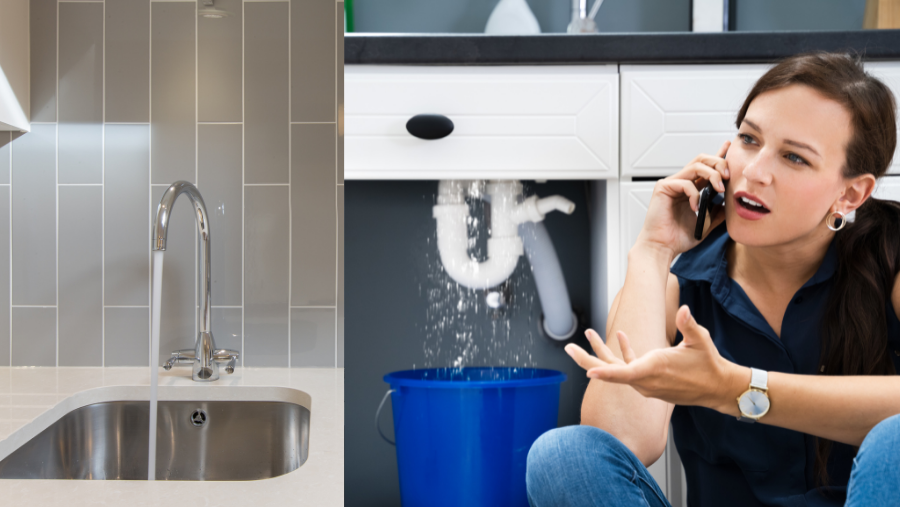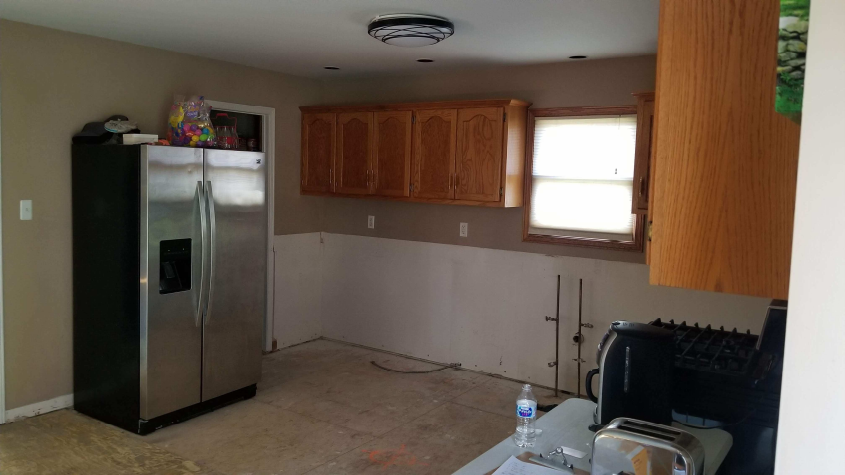Book My Estimate
Were you interested in help and advice about Causes of Water Damage in Kitchen?

The kitchen is the room where a lot of water activity takes place. You can rarely do anything without making use of water in the cooking area, from cooking, cleaning, and doing the dishes.
Therefore, inspecting your kitchen area periodically is a need. This is because it has a higher chance of getting water damage due to the appliances you use there.
When defective, these appliances that control water could make your kitchen messy and also influence the framework of your structure over time.
Let's examine out some reasons of the water damage in the kitchen area and what you should look out for.
Some Sources Of Water Problems in the Kitchen
These are a couple of root causes of water damage in the kitchen area.
Faulty Drain Piping
Drain pipes Pipes are essential parts of our homes, especially in our kitchens and bathrooms. They obtain defective by obtaining blocked, cracked, as well as burst. Or even worse, they can be wrongly or freely linked; whichever the case might be, it can be an extreme problem.
Damaged drainpipe pipes can create water damage as well as, as a result, create mold development as well as disfigure the appearance of your wall. It can additionally make the afflicted area look unpleasant.
For that reason, it is a good idea always to check to make certain that all the pipes remain in good condition as well as obtain a sound pipes system to maintain and also repair any kind of problems.
Faulty Cooking Area Sink
The kitchen area sink is an essential and the majority of used part of the kitchen area. Therefore it is prone to water damage; damages such as obstructed pipes, leaking pipelines, and malfunctioning taps.
These damages can be frustrating, especially when one is hectic in the cooking area. However, it doesn't simply take place without giving a clue or a sign. Right here are some indicators to recognize when your sink is not okay
So, these are the major problems that can occur to your kitchen area sink. One means to quit this damage is by making sure that food fragments do not obtain right into the pipes. You are also examining the pipelines as well as faucets and also making sure that it is correctly fixed and also in good condition.
Dripping Dishwasher
Dishwashing machines make life in the kitchen simpler. It is an optional cooking area home appliance and also, when offered, can be a resource of water damage. Additionally, like various other devices, it will certainly establish faults gradually, even with upkeep.
One of the mistakes is leaking via the door or underneath the dishwasher. These mistakes develop as a result of age, fractures, wrong use, loose web links to pipes, and so on.
Faults because of age come from constant usage. As a result, the door leakages as a result of shutting and opening up.
Faults from the wrong use may trigger water damage by presenting cracks to it. It is suggested to follow the hands-on overview of the dishwasher to stop this certain damage.
The leaks under the dishwashing machine can come from fractures in the gasket, tube, and incorrect or loose connection to water pipes or drains pipes.
This sort of leak typically goes undetected and also can be there for a long time. Nevertheless, as a result of the moment frame, it could cause and damage the floor mold and mildew development.
Extra so, the longer the water stays, you will discover the bending of the flooring where the dishwasher is. When checking if your dishwashing machine leakages, this is a great indicator to look out for. Detecting and fixing this on schedule stops serious water damage to your flooring.
Bottom Line
Watching out for damages in your kitchen area can be charging however required. It makes your work there much easier as well as much safer.
The reasons provided above are just a couple of aspects to think about, particularly if your kitchen area has a lot of appliances.
Obtain an expert plumbing service to come around and also examine for any kind of damage and get them dealt with.
It makes your kitchen location damp as well as messy, particularly when dripping from the pipes. And also if it is leaking from the faucet, it leads to water wastage.
It is an optional cooking area device as well as, when available, can be a resource of water damage. Extra so, the longer the water remains, you will see the bending of the floor where the dishwasher is. Detecting as well as fixing this on time protects against severe water damage to your flooring.
WAYS TO PROTECT YOUR KITCHEN FROM WATER DAMAGE
The kitchen is one of the most significant rooms in your house, as it is a multipurpose room wherein you can do your cooking and cleaning. Nowadays, homeowners tend to ignore the problems under their sink or appliances because of their busy schedules. However, most household floods occur due to plumbing and appliance failure. One of the most common scenarios that cause water damage to your kitchen is when the dishwasher malfunctions and floods gallons of water.
Water damage in your kitchen can cause several problems, including cosmetic damage, mold growth, and even an unpleasant smell. Often, if you fail to neglect the problem, there are always consequences. This article will help you protect your kitchen from water damage.
Common Causes of Water damage in your kitchen
Pipe problems are the most common source of water leaks under your sink. If homeowners ignore this issue, it will burst and flood the kitchen. Dishwasher leaks can be a source of water damage in your kitchen. An old, broken, and defective dishwasher can cause leaks, damage to your floor, and even mold growth. Refrigerator leaks can cause water damage in your kitchen, as sometimes melted ice from defrosting can cause leaks. Furthermore, if your refrigerator has internal problems, it is very likely to cause water damage. Back-splash and sink caulking can cause discoloration and water damage to your countertop tiles. Ways to Protect Your Kitchen From Water Damage
Regular maintenance
The most important thing you can do to protect your kitchen from water damage is to inspect the sinks, drains, and pipes, as well as the kitchen appliances, regularly. As with the sink, check for missing or deteriorated caulk. Remove the old caulk and clean the area thoroughly and re-seal it with fresh silicone. Furthermore, sweep the drain regularly, empty the filter and dispose of the debris in the garbage, and inspect the supply lines and valve for cracks.
Check your appliances
Check the user’s manual for instruction and proper use of every water-related appliance installed in your kitchen. For the dishwasher, check this procedure to prevent the dishwasher from flooding your kitchen. Check the appliances that need water, such as the coffee maker, ice maker, and water cooler, as they can become the cause of water damage in your kitchen. You may call a professional to check and repair damaged appliances and professional restoration for water damage clean-up.
Garbage clean-up
Fats, oil, and grease are common in the kitchen. Pouring them down the drain can cause clogs and sewage backup, which may result in significant kitchen water damage. If your kitchen sink is clogged, use a solution of hot water, baking soda, and vinegar to unclog the fats and oils in the pipes. Also, make sure to throw out the debris in the trash and clean the sink properly using paper towels for greases and oil and soap or bleach solution for the sink itself.
Shut off your water line
Make sure to shut off your main water line, especially if you're away and having some flood issue. As mentioned, dishwasher leaks are one of the most common culprits of water damage in the kitchen. So, make sure to only use the dishwasher if someone is at home and available to attend in case a problem arises.
Furthermore, it is also important that every member of your household knows where the shut-off valves are located. So in case of an emergency, they can mitigate the damage by turning off the water source.
Install leak detectors
One of the best ways to catch water damage before it could even cause serious damage to your home or business is by installing a water or leak detector. A leak detector monitors the flow of water through a pipeline, can detect moisture in the air for molds, and tracks the water temperature. Also, it can shut off your water line in case of an emergency. Install leak detectors under the kitchen sink, near the dishwasher and refrigerator.
https://superiorrestore.com/7-ways-to-protect-your-kitchen-from-water-damage/

I found that piece on Water Damage in Kitchen when doing a search on the internet. So long as you appreciated our blog posting please make sure you remember to pass it around. Thanks a lot for taking the time to read it.
More Details